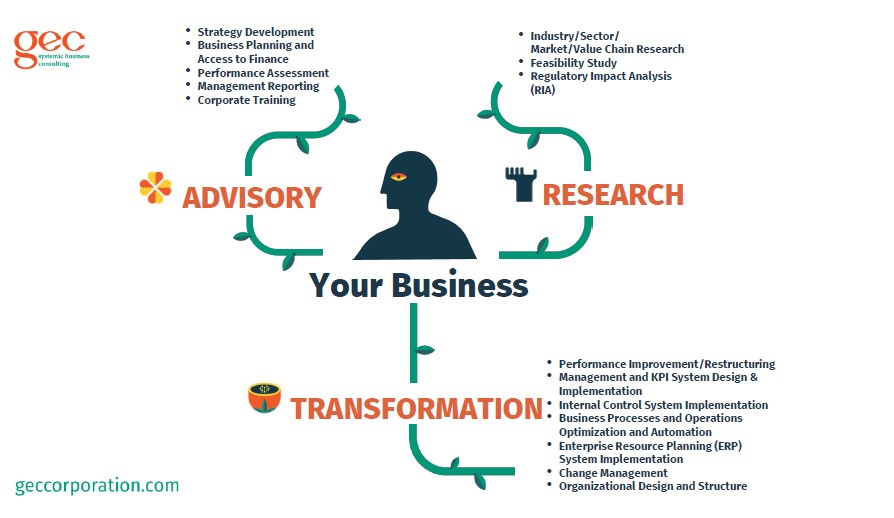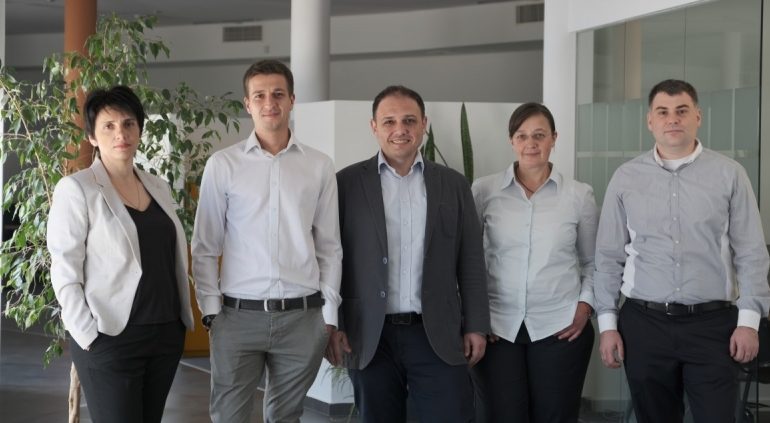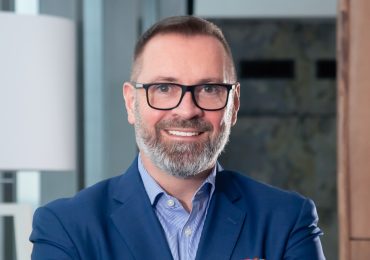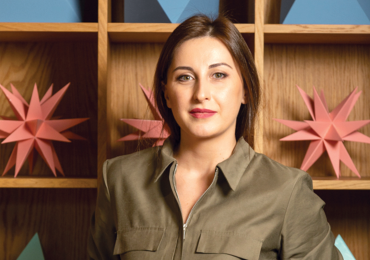Tamar Simongulashvili – Partner; Revaz Bakuradze – Senior Business Consultant; George Simongulashvili – Partner; Eka Katamadze – Partner; Irakli Mizandari – Senior Business Consultant.
GEC has been providing management consulting for the private and public sectors in Georgia since 2010. Today, the company also operates outside of Georgia, with 23 members of the team working in eight languages in three different countries. Their multi-profile knowledge and experience, diversity, and modern methodological and technical approaches – these are the main assets that distinguish GEC’s team from the competition. Forbes Georgia recently spoke with one of the company Partners, George Simongulashvili.
George, GEC has been operating for 10 years. According to your own observations, how were the business needs of the country changing during this period?
During this time, businesses were developing at a good pace. From the beginning, when we first started, companies would mostly contact us with needs such as company growth, market capture, or simply a change in organizational structure. In recent years, several main directions have stood out. On the one hand, companies will appeal to us to develop new and existing business directions, develop strategies, and implement them. On the other hand, a different type of transformation is requested by companies that have grown naturally; accordingly, they require adjustments to their management systems so that owners and senior management can delegate more authority to the junior employees. Companies are also paying more attention to their efficiency and are more observant of their own business models.
We can’t miss COVID-19 and its impact on business. What are the main problems Georgian companies face due to the pandemic?
Several sectors have been hit very hard by the crisis, like “HoReCa” [hotels, restaurants, cafés]. However, in general, the attitude is not such that this is the end of everything. On the contrary, most companies are trying to prepare for the time when the pandemic is over; therefore, currently they are adapting to the situation. Today, most companies contact us because they need to rearrange their business models and internal systems in order to be ready for similar types of shocks in the future. Until now, no one thought about the [effects of a] pandemic and how to maintain business flow. For instance, it was quite hard to imagine that a business could fully operate remotely and that the majority of its employees could work from home. Companies engage with us for help with developing and expanding their future business models. Businesses are trying to cope with the crisis as efficiently as possible so they can easily migrate to a pre-pandemic state. COVID-19 has largely shaken the supply chain for small companies; hence they need to make some adjustments as well.
In my opinion, all crises can be approached in one of two ways: one way is to lock up and try to defend oneself, and the other is to act, adapt, and maintain balance. Today, regardless of the size of the business, I think that companies with flexible approaches prefer the second option. For example, we have relatively small partner companies, although somewhat like the HoReCa sector, they do not stop and focus on responding to the challenges and developing. One option is to make decisions by yourself for the company, and the other is that someone can show you the internal problems at a better angle. Therefore, our role has largely increased during this period.
Recently, American billionaire Warren Buffett said that we should have been prepared for this crisis. How ready do you think businesses were in Georgia for such a large-scale crisis?
This is not a financial crisis; this is a health crisis that has affected the economy and shifted the distribution of various resources between industries. Accordingly, I think that the impact of the pandemic, in general, should not be fatal. Companies in Georgia were less prepared. However, the country has managed to stabilize the pandemic, so the outlook of Georgia’s business sector should be more positive than elsewhere. Overall, I can say that the world hasn’t seen such [disruption] for a very long time, and I don’t think that anyone could have been prepared for this, besides maybe some businesses in developed countries.
GEC has implemented more than 100 projects since its establishment. Who primarily are your customers?
We mainly work with companies that need to improve the efficiency of their management systems and performance activities for growth and development. The second type of company includes those wanting to optimize and automate their business processes, which includes simplifying, improving, and introducing new technological tools. Lastly, the third category, including start-ups, wants to generate new directions; in this area, we offer support for business models and strategic development. Public organizations are also our customers. [For all entities,] GEC’s main objective is transformation, which involves arranging operational activities and developing systems suited to the goals of the company, which, sequentially, improves the efficiency of the organizational activities – this is a complex process. We have worked with companies like m2, Expo Georgia, OPPA, SOCAR Georgia Petroleum, Retco, AzRy, Aptos, White Studio, among others.
You mentioned that you use a systemic approach to assist businesses. What does that mean, and how do you help companies achieve efficiency?
We view companies as a system within which there are many different bolts, many small systems that are interconnected and need to work properly. There are cases when companies have recognized some problems; however, in reality, they are only noticing the effect or the result of a particular issue, which itself is not visible on the surface. Accordingly, at GEC we first study the company in depth and use a systemic, complex approach that includes a company analysis on three levels: organizational/strategic, business processes, and employee/executor. The conceptual logic at GEC is to perceive the company as a single mechanism and manage the process between all of the internal units. With our approach, companies improve their management and achieve efficiency.
GEC also consults companies in the restructuring process. I wonder, how frequently do such cases arise, and how painless is this process?
One aspect of the core direction of transformation is to assist companies in restructuring, implementing, and managing changes. Each year, we implement several such projects, which are relatively long, complex, and focused on predetermined results with customers. Our experience has shown that after cooperating with GEC in terms of restructuring, customers have satisfying results, which is reflected in sales growth of about 20-25% or a 10-15% reduction in costs. Despite the complicated process, we have developed our approach, and it can be said that we have not had a failed project in this regard.
As you mentioned earlier, you provide services to both private and public institutions. I wonder, what is the difference between them when it comes to organizational and structural problems?
In terms of the model, whether the organization operates in the private sector or the public is not a big difference. Nowadays, public organizations in Georgia and developed countries are also trying to focus on service provisions. Therefore, if a public organization focuses on its customers, then by organizational logic, it should resemble a private organization in some ways. The difference between private and public is that in private organizations, we can do anything that is not forbidden, while in public organizations, we can do only what is written in the law. Also, it is desirable to achieve efficiency in private companies, as they are profit-oriented. And while it is difficult for the public sector to understand how to express efficiency, this is exactly what we are interested in – to show public sector organizations what their effectiveness is. GEC has worked with almost every ministry, as well as with organizations such as the Revenue Service, the Pension Agency, the Public Service Development Agency, and others.
Your company is an exclusive representative of IFS (the leading international supplier of enterprise resource planning software) in Georgia, Armenia, and Azerbaijan. You have also entered the markets of Kazakhstan and Kyrgyzstan. What is the difference between those countries in terms of business needs?
The GEC team consists of employees with diversified knowledge who have received education and experience in several foreign countries (France, Germany, Spain, the United Kingdom, and the United States). Therefore, about three years ago, to diversify our portfolio and also to tackle new and interesting challenges for the team, we decided to expand beyond Georgia. For the first stage, we decided to enter Kyrgyzstan because of the similarity of the economic structure. Today’s demands from businesses in Kyrgyzstan are similar to the business needs that arose in Georgia earlier – for instance, ways to penetrate the market and offer a new product. However, the requirements for how to improve management systems are not yet clear. In Kyrgyzstan, due to the COVID-19 crisis, most companies are still thinking about how to react to the challenge. Unlike Kyrgyzstan, more and more companies in Kazakhstan see the crisis as an opportunity and try to adapt. In those two countries, we have a representative team, and as for Azerbaijan and Armenia, we have implemented separate projects so far.
Finally, what is GEC’s advice for business organizations?
What Georgian companies can do is to look deeper into their business models and focus more on customer-centric approaches. I think the pandemic has shown them that a change in managerial systems and internal technological development is crucial. What’s more, companies should make decisions based on analysis and not impulsively. This is something that every company needs to do constantly and continuously for their development.

"Forbes Georgia-ის სარედაქციო ბლოგპოსტების სერია "როგორ გამდიდრდა“ და "საქართველო რეიტინგებში".















